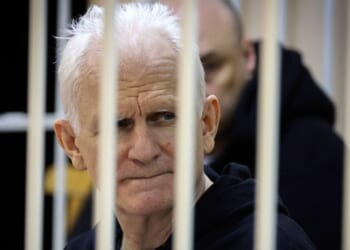AS THE General Synod considered the prospect of the being at war, in the shadow of the 80th anniversary of Victory over Japan on Friday (Synod, 1 August), I want to ask: how should the UK prepare for war — and what type of war?
Many still believe that it was the atomic bombings of Hiroshima and Nagasaki which ended the Second World War. Historians now question this, however, pointing, instead, to Japan’s readiness to surrender because of the imminent and much-feared Soviet invasion. Terrible though the aftermath of the bombs was, it initially seemed no worse than the firebombing of Tokyo, which killed at least 100,000. The real horrors of radiation were still unknown to the world.
The realisation that the bombings were strongly opposed by many politicians and military leaders in the United States — and were probably more about testing these new weapons than ending the war — is one of several factors that have reshaped my thinking about nuclear deterrence.
In the 1970s, I served as second-in-command (and occasionally in command) of a Polaris missile submarine. At the time, I accepted the concept of nuclear deterrence, believing that we would ever launch our missiles only in the unlikely and extreme circumstances of having first suffered a nuclear attack. When the Cold War ended, I expected the nuclear weapons in the UK to be decommissioned. Instead, the government of the day planned to build a new fleet of Trident missile submarines.
I feared that the enormous cost would weaken significantly our conventional military forces — a fear now fully realised — and began researching the rationale behind the decision. I discovered that, while governments implied publicly that these were “weapons of last resort”, they never ruled out conducting a pre-emptive (first) strike. Under pressure — including some of my own — the Ministry of Defence has since acknowledged this, but only if you know where to look.
The fact that such a critical detail was kept from us submariners marked a turning point in my thinking. It raised serious questions about the integrity of governments of all stripes in justifying nuclear weapons, and the lawfulness of a first strike.
THE real reason for their possession seems more about national prestige and a seat on the UN Security Council than genuine defence. This “bigger stick” syndrome was exposed with open access to Soviet archives during the post-Cold War Glasnost period. It is now clear that the USSR never planned a nuclear strike as part of an attack on Europe. Their build-up was purely defensive — and yet it led to a massively expensive and extremely dangerous arms race.
Another crucial influence is Chatham House’s authoritative study Too Close for Comfort, which documents 14 incidents in which accidental nuclear war was only narrowly averted; and a further incident occurred soon after the report was published. As thousands of weapons remain in existence, the statistical chance of an unchecked accident remains very high.
Other troubling issues persist. Uniquely among nuclear powers, the UK Prime Minister can, with no third-party checks or balances, authorise a nuclear launch — and in response to any form of attack, not only nuclear. Furthermore, UK submarine captains receive a “Letter of Last Resort”, which dictates their actions if the Government has been destroyed. Legal experts argue that an order (possibly written years earlier) by a presumed-dead Prime Minister, and without knowledge of the full situation, is not lawful.
MEANWHILE, progress under the Nuclear Non-Proliferation Treaty remains stagnant. The hypocrisy of nuclear-armed nations’ telling others not to build such weapons, while simultaneously emphasising the value of their own, risks spreading the desire to join the nuclear club. At the same time, the enormous cost of maintaining these arsenals comes not only at the expense of conventional defence — increasing the likelihood that the UK would have to resort to nuclear warfare at an early stage — but also of welfare and overseas-aid budgets (News, 28 February).
Indeed, a series of defence reviews seem to have accepted that this would be the case. Instead of a much-needed increase in conventional-warfare capability and numbers of personnel, the Government has increased its stockpile of Trident warheads, embarked on an enormously costly new nuclear-warhead programme, and intends to procure F35A aircraft capable of carrying the US-owned and controlled B61-12 bomb.
This seemingly entrenches a policy of reliance on nuclear weapons to deter any form of attack. The B61-12s are tactical battlefield weapons, the exchange of which results in “armageddon”-type scenarios akin to the use of strategic nuclear weapons; but the general public are being led to believe that they are “safer” to use than Trident.
Faced with the immorality and illegality of use of nuclear weapons, and no record of their ever having prevented any type of warfare involving a nuclear-weapon state, I have concluded that the world would be better off without them. So, too, have other respected figures, including a former US Secretary of Defense, and a UK Chief of the Defence Staff.
In the mean time, if political leaders insist that we have them, then we must insist that this be at the very minimum level needed to threaten a retaliatory second strike, and solely in the event of a nuclear attack.
Commander RN (Rtd) Robert Forsyth served in the submarines from 1961 to 1981. whytrident.uk















